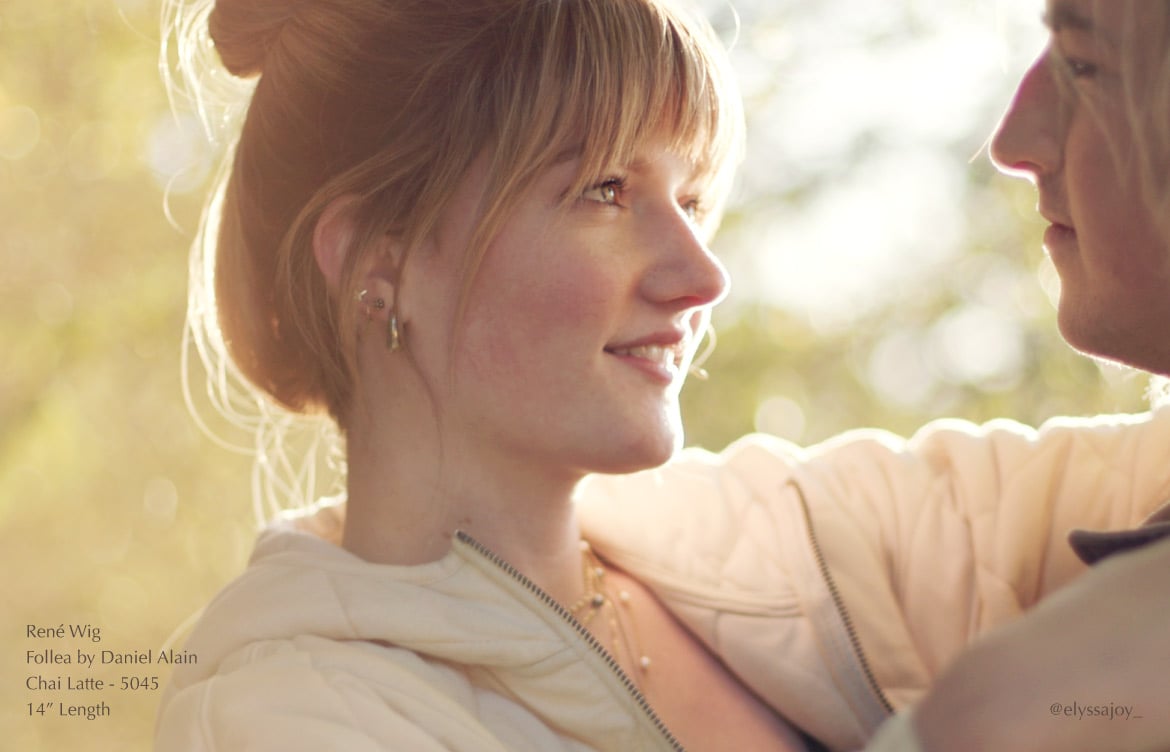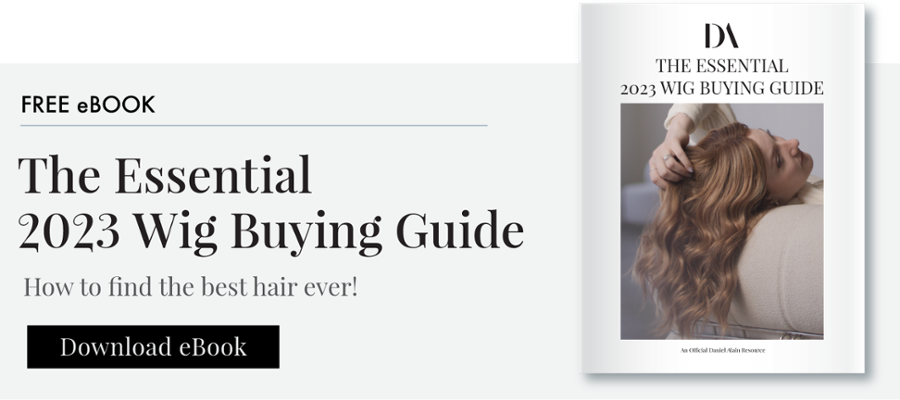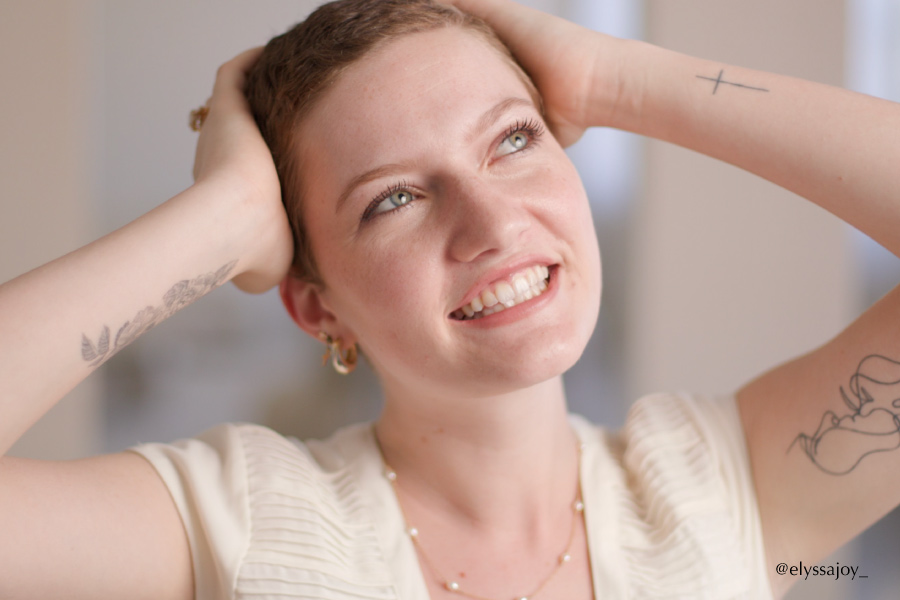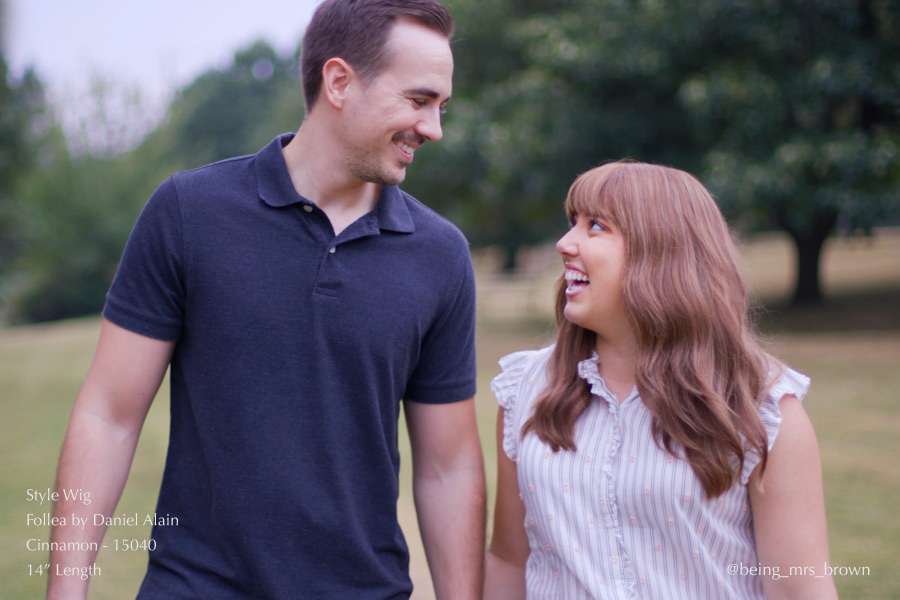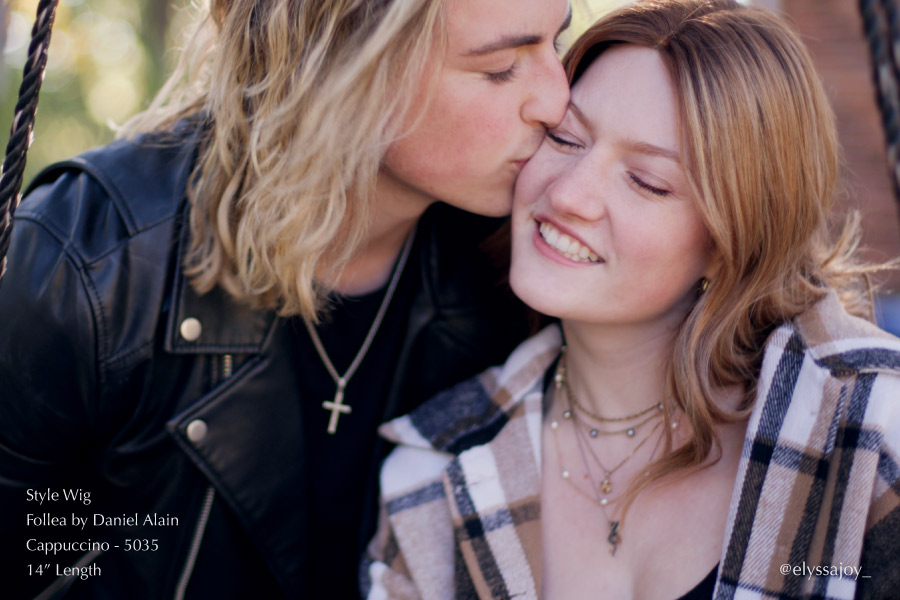Any woman who has ever battled hair loss has faced challenging questions and insecurities while dating. Unfortunately, hair loss still remains a largely stigmatized issue, and many women feel embarrassed and even ashamed to share their struggle with their partner. Bottom line? Dating with alopecia can be tricky.
You might feel insecure enough to try hiding your hair loss from your partner, avoiding certain social situations, and acting elusive during intimate moments. The stress from hair loss might also strain your relationship, as you could feel pressure even in the simplest life activities, from social lunches to date nights.
We’re here to change that.
Whether you’re just starting dating someone, things are getting serious, or you’re in a committed relationship or long-term marriage, dating with hair loss opens up anxious feelings and can even hold you back from embracing love that you deserve to enjoy without feelings of shame.
And if you’re dating with a wig, you might wonder:
- What happens if I wear a wig on the first date and it slips?
- What happens when I take off my wig in front of my partner? What will they say?
- What happens if they reject me?
These are vulnerable thoughts that millions of women like you experience every day. But we’re here to change the narrative and empower you with reliable hair loss solutions that take the shame out of dating with alopecia.
In this guide, we’ll shed light on all your questions and concerns about dating with alopecia. We’ll help calm the anxiety so you can feel more confident in your relationship.
First Things First
Before we dive into dating with alopecia, let’s set the record straight:
You’re beautiful exactly as you are, and nobody, not even your spouse or that negative self-talk so many of us women experience can strip away your beauty. Your hair loss doesn’t define you, and you have innate beauty and value – period.
Now, let’s cover a few common questions we hear about dating with alopecia.
do I TELL THEM?
It’s hard to open up about hair loss to new partners and spouses. One study led by dermatologist Dr. Aldhouse et al. sought to learn more about androgenetic alopecia patients and how their hair loss affected their relationships.
Results showed a couple of patients too nervous to bring up hair loss to their partners. They’d hide it early on out of fear of being judged or rejected. Here’s what one female 27-year-old patient said:
“I’m not as outgoing as I was. I don’t want to go make new friends and meet new people. [...] I’d rather just kind of stay home and be alone so I don’t have to deal with people asking and looking at me.”
One of our clients, Jenn, felt the same way:
“When my hair first started to fall out, I was mortified. Here I was in my young twenties feeling like the only person my age dealing with hair loss. I was so embarrassed by my thinning hair and tried my best to keep my biggest insecurity a secret from others.
I found a solution that worked for my hair loss and I stopped feeling so scared of my hair falling out… I started feeling less and less consumed.”
As Dr. Aldhouse et al. describes, men and women with genetic hair loss take great lengths to conceal it. Disclosing their struggle to a partner is no easy feat. After all, so many of us, especially women, see our hair as a source of femininity and empowerment. And when it starts to fall out? We question our worth and self-image.
So when it comes to answering the question: should you tell your partner about your hair loss?
The answer is often “I don’t know.” And not knowing leads to feelings of secrecy, and in turn, shame.
The decision is 100% yours. But we champion you to be open and honest about your hair loss. Doing so will alleviate any feelings of shame and doubt, and give you space to get it out in the open.
If you decide to tell your partner, when is the best time? When Do I Tell Them?
With difficult conversations, it always feels like there’s never a right time. And this is precisely why so many women put off telling their partners about their hair loss.
One anonymous Reddit user advises to share your hair loss once you feel the relationship is getting serious:
“I’d typically only tell the guy about my androgenic alopecia once it seemed like we [were] close to becoming serious/exclusive. That’s because by then I’d feel truly comfortable with them, and I’d also have a really good sense of how they might respond to it. Thus far, my instincts have been right — none of my boyfriends have had any issue with it.”
You have every right to keep your hair loss to yourself until you get to know someone better. But there’s no right answer. You might feel a giant sigh of relief if you share your hair loss story on a first date! Our happy Follea client Melissa Douglas elaborates:
“I usually tell them pretty early on just to be honest and keep the conversation open.”
You are not obligated to tell someone you’re dating about your hair loss, but if you feel like you should, how and when you do it is on your terms.
How Do I Tell Them?
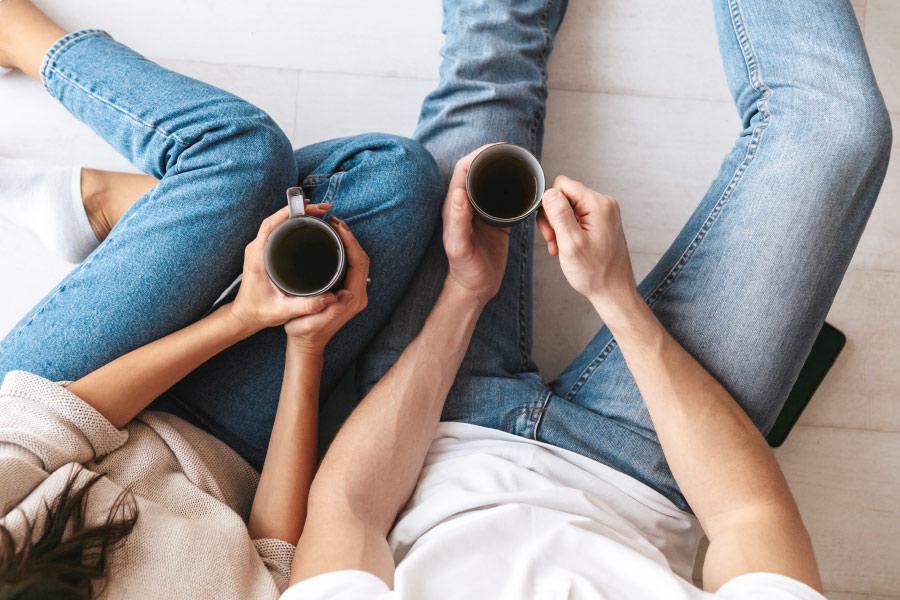
Teresa Newsome is a writer and former Planned Parenthood Certified Responsible Sexuality Educator. When bringing up difficult topics with a partner, she reminds us to be calm and remember: you’ve got this.
She also mentions a few more tips to help you feel more comfortable about leading the conversation:
- Be honest.
- Talk sooner rather than later.
- Set boundaries and stick to them.
Of course, these are easier said than done when dealing with hair loss. You want to be honest, but you’re paralyzed by fear of rejection. Perhaps you feel the urge to bring up the conversation, but don’t know how to start. Your anxiety makes it hard to accept that a poor reaction might disrupt the harmony of your relationship.
Here’s what we’ve noticed. Our clients feel supported and cared for when they tell their partners about their alopecia. It’s a vulnerable conversation to have, but usually worth it. We see so many partners of women with alopecia jump in to be such a strong emotional support system as they endure the challenges of hair loss.
Sharing your experience will mean sharing the burden of it with someone who loves you and wants to support you on this journey.
If you feel nervous leading up to the conversation, try these tips:
- Schedule the conversation: Send your partner a message and clear a set time in your schedule to discuss your hair loss. This saves you from agonizing over putting it off any longer. Plus, it’s harder to avoid when your partner’s expecting the conversation.
- Talk somewhere private: Being in the comfort of your own home will give you a safe environment to open up about your hair loss.
- Protect your peace: If the conversation doesn’t go well and you feel like you want to be alone, just say that. You can always revisit it again later after having time to reflect.
So you’ve shared your hair loss with your partner. Now what?
How Should They React?
That same study led by Dr. Aldhouse presented many common anxieties and thoughts amongst men and women with alopecia. But one slightly comforting finding was this:
Only 18% of patients said their hair loss impacted their romantic relationships.
Now, that doesn’t mean it’s always sunshine and roses. Dating with alopecia might feel confusing and foreign at first. Some partners don’t always respond well in the beginning. They might have their own insecurities and stigmas about hair loss, and that’s not your fault. But you also don’t have to appease their reaction if it isn’t supportive.
Also remember that first reactions can be driven by emotions that aren’t always genuinely how your partner feels. If they have a curt or unideal reaction, give them time to let things sink in. If your partner came to you with a serious insecurity, how would you react? Hopefully, you’d embrace them and make them feel loved and supported.
Guess what: you deserve the same compassion.
Our Follea friend Elyssa describes her husband’s reaction when she shaved off her thinning hair:
“I shaved my head and look[ed] like a little boy…but my husband still thinks I’m hot.”
Another Follea friend, Mirna, describes the reaction from her spouse:
“He loves me bald and he loves me in all the varieties of hair my wigs allow me to have! He tells me to take off my wig when it’s time to settle down for the day and tells me not to wear a wig at all. I’m not quite there yet in my journey, but it’s nice to know he would support that if I wanted to go without. Life threw us a curveball with my hair loss, but we’ve grown stronger because of it.”
Mirna’s partner wins extra points for encouraging her to feel as comfortable as possible in her own skin.
But if you don’t find this level of support when you broach the subject, remember that you are beautiful, strong, worthy, and valuable, and you deserve to be loved and accepted no matter what stage of hair loss you’re experiencing.
And also remember that hair loss doesn’t have to rob you of your femininity. There are high-quality human hair wigs and toppers available that move and bounce as naturally as real hair, because they are made with genuine European human hair.
Dating With a Wig? Check out the Most Natural Looking Wigs in the World from Daniel Alain

Dating with alopecia can feel discouraging, stressful, overwhelming, and even debilitating. But in the same vein? Dating with alopecia is empowering, strengthening, and rewarding. When you share about your journey with your partner, you lift a bit of the heavy load off your shoulders and share it with someone who cares about you. You’ll feel confident in your own skin knowing you’re not hiding the issue.
Like so many of our clients, you deserve to be with someone who makes you feel safe and happy.
If you start dating with alopecia, just remember to put yourself first and remember your worth, always.
One way to build up your confidence is with reliable, trusted hair loss solutions. Have you considered a 100% premium European human hair wig? Daniel Alain’s collection is unmatched in hair quality and construction. You’ll feel reawakened, with hair that falls so seamlessly and naturally, you’ll forget you’re wearing a wig.
Next time you consider dating with alopecia, step into a gorgeous Follea wig to instantly transform into the confident woman you were born to be. It’s easier to feel confident when rocking a luscious, silky-smooth mane that bounces flawlessly with your every step. But also remember that you don’t need anything to radiate confidence and beauty – you’ve already got all the ingredients within you.
If you’re curious about your options, we’d love to chat with you about our hair loss solutions.
book a free consultation
Our stylists will help you find the right hair loss solution just for you.

Frequently Asked Questions
Does hair loss affect dating?
Certainly. No matter the hair loss cause, men and women both experience anxiety and societal pressure when dating with hair loss. Of course, everyone is unique. People experience different emotions throughout their hair loss journey. We want you to accept yourself and feel confident in your relationships with effective hair loss solutions. Whether it’s a 100% European human hair wig, Minoxidil hair growth system, or anti-shedding hair treatment, Daniel Alain aims to restore your confidence and eliminate the shame attached to hair loss.
Does alopecia affect quality of life?
Medical studies say yes. Alopecia has a profound impact on your psychosocial health and mental state. Many men and women feel anxious and depressed when dealing with hair loss, to the point where it can affect their work and relationships.
But hair loss doesn’t have to hinder your quality of life. While studies show severe impacts, others describe the relief people feel once they find a suitable hair loss solution. One study showed that 46% of participants experienced a positive mental health impact after wearing a wig.
How can I help my partner with alopecia?
Dating someone with alopecia might feel difficult at times. They might be going through many conflicting emotions, but hearing them all can feel overwhelming.
But the best thing you can do is listen. Hold them, if they want that. Encourage them to speak openly about how they’re feeling and support them throughout the journey.
Of course, you should still hold boundaries for your own health, too. If you’re dating a girl with alopecia (or anyone else) and they continue struggling with the same issues for years, it might be time for them to explore hair loss solutions or talk to a professional.
What do you say to someone with alopecia?
“I’m here for you.”
“I accept you.”
“You’re beautiful.”
“How can I help?”
“Do you want support looking for hair loss solutions?”
These are only a few ideas to show support to a loved one with alopecia. While we all know hair loss doesn’t have to control you, try to stay away from dismissive statements like, “it’s not that bad,” or “there are worse problems to have.”
How do you cheer up someone with alopecia?
If you’re dating someone with alopecia, you might notice bad moods and bouts of anxiety. The best way to cheer them up is to ask what they need. You might assume a lecture about how beautiful they are would automatically cheer them up — but they might not want to hear that. They might prefer to be left alone, or to be held in silence. They might crave a night out without discussing the topic altogether. The most important thing is to be there for them and listen when they feel like sharing.

